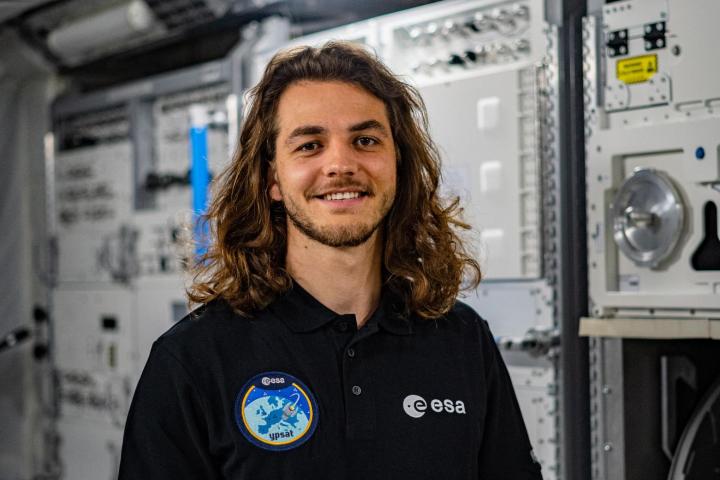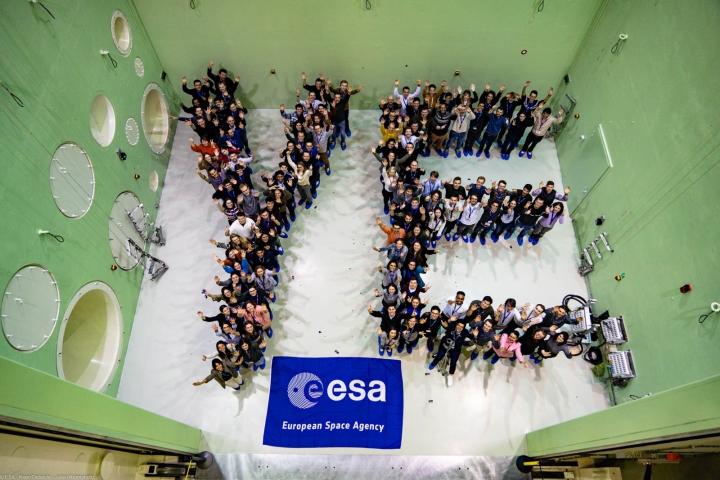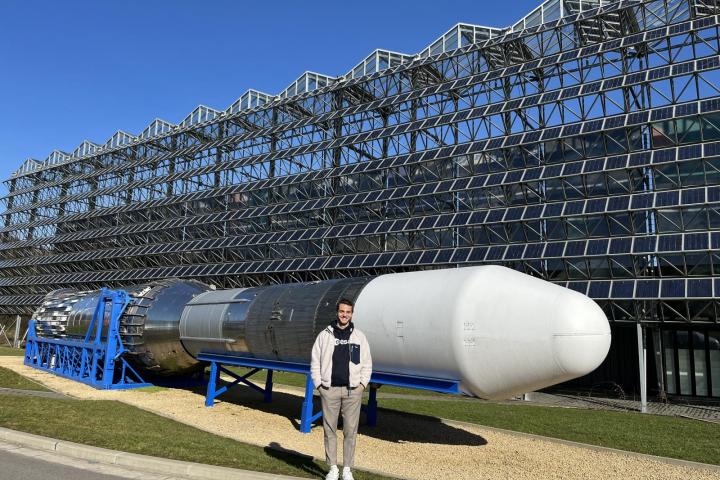
This way of teaching had a positive influence on a graduate of Faculty of Mechanical Engineering of the Czech Technical University in Prague, Ing. Filip Soukup, with whom we talked about the desire to acquire ever new and fresh knowledge and about sources of motivation for solving problems in exploring the universe.
Your interest in space technology probably began before you studied at CTU Faculty of Mechanical Engineering. What led you to become interested in space?
In the space industry, it is said that young children aspire to become astronauts, observe the night sky with telescopes and build Lego rockets. In my case, it's not exactly that I aspired to be a space engineer as a kid. But as they say, "the exception proves the rule". First I wanted to be a top athlete. It was only after I joined Czech Technical University in Prague and thanks to Faculty of Mechanical Engineering that I discovered the opportunity to pursue this field in the Czech Republic.
What programme did you study at Faculty of Mechanical Engineering?
I graduated with a bachelor's degree in TZSI (Theoretical Basis of Mechanical Engineering, now SI-Machinery Engineering) at Faculty of Mechanical Engineering and had an individual study plan focused on Management and Economics in Industry. For my bachelor thesis I chose FEA analysis and optimization of a part for the H80 aircraft engine from GE Aviation Czech. I still remember how Prof. Vampola suffered with me when I "released the lever" for him. This is the method to replace linkages, with binding forces in mechanics. However, all this was done to perfection and thanks to this I discovered the Institute of Aircraft Technology, where I joined the Master's programme in Aerospace Engineering.
DId you took the opportunity to study abroad for a few semesters during your undergraduate or graduate studies?
I did not take the opportunity to study abroad during my undergraduate studies. Despite this, I felt like I was on another planet at times, because it was very challenging at times. However, during my Master's studies I was familiar with the system of teaching at CTU and I felt the need to improve my foreign language, gain valuable experience and, most importantly, take advantage of the great opportunities and international relations that CTU has. I went to study the very first winter semester in Linkoping, Sweden. I focused on "Aerospace engineering & spacecraft design". Then I studied in Beijing for the next two semesters. Here I was already narrowing my dispersion of focus to space technology. It was very interesting to compare the strongly libertarian approach to teaching from Sweden, which mainly required creativity and teamwork, and the Eastern style of education, which mainly required theoretical knowledge and guided projects.
How did you get into the Belgian von Karman Institute of Fluid Dynamics (VKI)? Did you have to submit your own project or did a recommendation from a renowned scientist-educator suffice?
Again I must praise the cooperation with CTU, especially doc. Halama in this case, who suggested I attend a lecture by a former student of VKI. After listening to this lecture, I knew that I had to write my thesis at the von Karman Institute. They focus on both aerospace and aeronautics research and offer a Short Training Program that lasts 3-6 months and provides students with very challenging but interesting thesis topics. Thanks to strong motivation, recommendations from professors and projects I worked on in my free time abroad and in the Czech Republic, I was accepted to the institute. To be honest, our Institute of Aircraft Engineering offered many interesting topics, but I saw it as an advantage to write my thesis externally. It offers many advantages, such as possible consultations with local experts and often interesting job opportunities arise there. That is why I was also very happy that the VKI has well-prepared topics. I worked on the QARMAN satellite and its anomaly, which made this mission a failure.
You have completed an internship at the European Space Agency (ESA) as a Young Graduate Trainee (YGT). Did you join ESA as the only CTU graduate or are there more young engineers from the Czech Republic?
I sent my first application to ESA about five years ago for an internship during my studies. I had little experience and even my resume was very empty. I didn't get in. I found out about the YGT program during my master's studies and I told myself that I had to get in one day. It is a program of the European Space Agency, which opens about 100 positions once a year in a whole range of fields such as engineering, science, but also humanities, medicine, psychology, etc. In total, up to 7 000 candidates will apply. The successful ones will then have the opportunity to work alongside experts on current space projects for a year or two, attend many conferences and be at the very heart of the European space scene. This goal provided me with enough motivation during my studies. I also found a mentor, a former alumni of the programme, who helped me with important career decisions, but also with the application and preparation for the ESA admission procedure. Last year I was selected as the only Czech in this program. To be honest, it is quite challenging to "get through" the "pumped up" Germans, French and Italians, extremely strong in the space industry, with a very long tradition and excellent fields of study. Fortunately, ESA has a "geo-return policy" in which it awards industrial contracts but also staff positions in proportion to the financial contribution of the country. I would therefore also like to encourage all young Czechs to apply.
Were you involved in small satellite projects or other tasks at ESA?
My job at ESA is systems engineering and coordination of several small satellites, called CubeSats, within the ESA Academy programme. This job combines project management, but also technical disciplines such as reading production documentation and reports, working with space specific software and last but not least the skill of handling hardware during test campaigns. However, I wouldn't be me if I didn't get involved in anything beyond work-related matters. ESA in the Netherlands has a huge campus full of young motivated people and available equipment. That's why the YE group - Young ESA - was formed a year ago. Young professionals who wanted to create something of their own that would go into space. Together with this group, we decided to approach senior management to ask about possible opportunities. By pure coincidence, one of ESA's largest contractors - Arianespace - is developing Europe's newest launch vehicle, the Ariane 6, and we were given the opportunity to design and build the payload aboard this rocket for its inaugural flight from French Guiana.
You are, among other things, the systems engineer of the YPSat project for capturing important phases of the flight of the Ariane 6 rocket. As a member of the control centre, will you be involved in the evaluation of flight data?
YPSat has three main objectives during the mission. To detect the actual launch of the rocket, to launch autonomously and to record the opening of the fairing (an aerodynamic cover). Subsequently, to record the launch of other satellites from the ballast, the so-called deployers. Then the upper stage of the rocket starts to rotate in the so-called "barbeque roll" mode. We want to make recordings of the Earth while communicating with the ground station, which is a big challenge in itself. We have also attached experimental diamond magnetometers and a Hamsat radio that will be tested for performance in microgravity and space environments. Evaluating the data from the flight will definitely be very interesting. Especially monitoring the telemetry and the actual status of the individual subsystems and the post-processing and generation of the images and videos that we take from the flight, because then they will definitely be available everywhere on the internet. And we will be proud to say that a bunch of young enthusiasts have done something like this. I would love to see the actual launch in French Guiana or at least from the control center in Darmstadt, Germany, but space is limited and we'll see who gets the green light (more info at: https://www.esa.int/esearch?q=ypsat).
You have gained a lot of extraordinary knowledge and experience in a very short time. How will you make use of it further and expand it?
Experience, definitely. I'm not so sure about the knowledge. But I'm sure they're valuable too, it's more the fact that I'm constantly surrounded by experts in the field and young "geniuses" from Cambridge etc. that make mine seem insignificant. But again, that's the motivation that drives me forward. For me, the most important thing is to see growth, gain new knowledge and not do repetitive work. I observe that the Czech industry has understood the importance and benefits of investing in space technologies. Many interesting projects and startups are being created in our country, big foreign players are coming in and traditional Czech larger companies are diversifying in this direction. I would love to settle in the Czech Republic one day and maybe even bring the know-how acquired abroad, but for now I would still like to gain experience from the best in satellite design and construction, so I will stay here in Western Europe for a while.
Working on space projects is a great challenge for young engineers. Do you talk about such special opportunities with former classmates or current students?
It's definitely a challenge. If only for the reason that we design and engineer something, then launch it into space, and except for rare examples like Hubble solar panels, we never get to see the work. It is very hard to take away any valuable lessons and knowledge when we only observe it from a distance and then it burns up in the atmosphere at best. That's why the material and testing requirements before the flight are so demanding. One can't just fix a satellite.
I talk most often with my classmates from my master's studies. But they know all this very well. Most of them work in the Czech Republic for companies supplying services, components or entire systems to ESA, and occasionally come to our technology centre themselves. I am no less proud of them. I am no longer in contact with the current students, but if any of the Czechs get into the YGT program, I will be happy to share all my experiences with them.
Could you ever popularize the Czech contribution to space research by giving a lecture at the Engineering Student Club at Faculty of Mechanical Engineering of Czech Technical University in Prague?
I'd love to make it popular. I have offered myself several times to the Institute of Aircraft Technology and even to the ESC itself. I don't think it's common knowledge, but the Czech Republic is involved in a lot of activities and whether it's industry, opportunities for students or graduates, you can find a way to participate in the space race.

